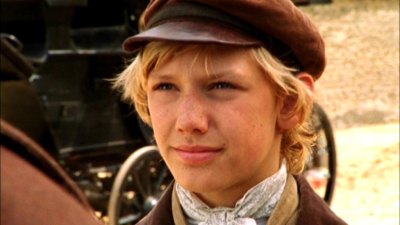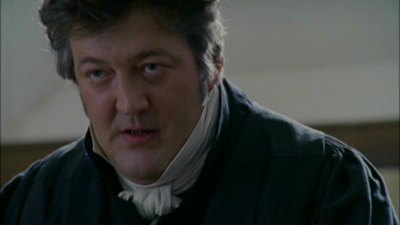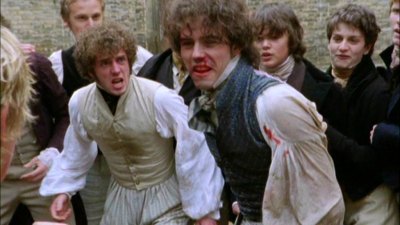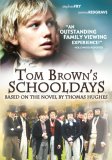| Reviews & Columns |
|
Reviews DVD TV on DVD Blu-ray 4K UHD International DVDs In Theaters Reviews by Studio Video Games Features Collector Series DVDs Easter Egg Database Interviews DVD Talk Radio Feature Articles Columns Anime Talk DVD Savant Horror DVDs The M.O.D. Squad Art House HD Talk Silent DVD
|
DVD Talk Forum |
|
|
| Resources |
|
DVD Price Search Customer Service #'s RCE Info Links |
|
Columns
|
|
|
Tom Brown's Schooldays
It's been quite some time since I read Thomas Hughes' seminal public school novel, Tom Brown's Schooldays, which detailed the travails of the young lead character's journey through the rough and tumble world of real-life Rugby School. Watching ITV's 2005 television adaptation, Tom Brown's Schooldays comes across as an entertaining enough little melodrama, but quite a lot of the meaning of the book has been left out, with some curious plot changes and omissions altering the intent of the original work.

For this film adaptation, the story starts off with young Tom Brown (Alex Pettyfer) being sent to boarding school for the first time. Reminded by his father (Julian Wadham) to be a good, Christian fellow, and to learn from the cruelties that he will witness at school, Tom trepidatiously sets out for life on his own at the wild Rugby School. Befriended by East (Harry Michell), another small boy who's learned the ropes at Rugby, Tom is shocked to experience the intense cruelty and lax moral character of many of the pupils at the school. In addition to very young boys drinking alcohol, gambling on horses, maintaining firearms, and smoking cigars, the practice of bullying by the older pupils, in many cases involving severe physical injury to the victims, is rampant at Rugby, and actively endorsed by the head masters at the school. Falling in line with the thinking at the time that such cruelties were necessary for boys to mature into men capable of inheriting and maintaining the British Empire, these improprieties and cruelties are accepted as the natural order of the world at Rugby.
Into this hellhole comes real-life figure Dr. Thomas Arnold (Stephen Fry), a crusading headmaster who vows to obliterate all traces of unChristian behavior at Rugby, and to instill an atmosphere of love, sympathy, and Christian tolerance in which young boys may mature into responsible English gentlemen. He faces an uphill battle. Not only is the staff resistant to change, but the older boys, many of them raised for years in this punishing environment, see Arnold's revamping as an assault on the revered traditions of the school. Vowing to help those who have been bullied, Arnold still can't get victims to name names of those who do the bullying, including young Tom, who has learned enough by now to keep his mouth shut. Soon, Tom becomes hardened to life at Rugby, becoming as equally a disruptive force in the school as Flashman (Joseph Beattie), a sadistic bully who targets Tom from day one in his daily tortures. Flashman, whose family contributes large amounts of cash to the school, reigns over the school like some avenging demon, slashing at boys who are unfortunate enough to get in his way. In addition to his heinous cruelties, he also finally manages to take advantage of the school matron's daughter, Sally (Georgia Moffett), by promising marriage, getting her pregnant after unsuccessfully trying to rape her the first time.
SPOILERS
Just as young Tom seems on the edge of becoming another Flashman, Dr. Arnold assigns new boy George Arthur (Harry Smith) to Tom's care. Frail and naive, with an overriding belief in God, George reminds Tom of himself when he first arrived at Rugby, and soon he's defending young Arthur against the other boys. However, Flashman, seeing a new boy too weak to defend himself, decides to bully George, with devastating results. The inevitable confrontation between Tom and Flashman occurs, with Flashman resorting to his usual dirty tricks (brass knuckles) to win. However, the death of George seals Flashman's fate, and the film ends with Tom attending George's funeral.

There doesn't seem to be a clear purpose to this latest adaptation of Hughes' influential work. While it's always difficult to pare down a literary work for a short film, too much has been lost or changed from the original story to satisfy the author's intent. The all-important first part of the novel, where Tom enjoys his idyllic existence at home, is missing from the film, thereby eliminating any context for the horrors that are about to come his way at Rugby. Once at Rugby, the film falters in delineating Tom's metamorphosis from bullied boy to bully, without ever really showing the final end result of Hughes' Brown: a fine, upstanding Christian gentleman. The depiction of Dr. Arnold is also fraught with hesitancy. Does he succeed as a reformer? Or is he a bungler? The movie can't make up its mind, often showing Dr. Arnold screwing up something, when in the novel, he was the shining example of moral certitude and forthrightness. It's difficult to say what possible good Dr. Arnold's efforts may have achieved, particularly when the filmmakers refuse to show a concrete progression of maturation within the lead character, Tom Brown.
Indeed, the film just lamely ends with the death of George -- which is not in the book -- perhaps in an effort to give some kind of grandiose solemnity to the proceeding drama. But that made-up ending totally subjugates the purpose of the Arthur character in the novel. In the book, Arthur survives his hazing by Flashman, and his pious example proves a catalyst for the other boys to reform their hardened ways -- especially Tom. But we never see that transformation here in Tom Brown's Schooldays. The Arthur character is treated merely as a minor sub-character who sets the wheels in motion for Flashman's fight with Tom. The ending of the film -- the funeral of George -- is meaningless because we never really got to know the character, and his invented death serves no purpose in illuminating the Tom Brown character. Did Tom respond to Dr. Arnold's efforts? Has he relinquished bullying? One can't say watching the end of Tom Brown's Schooldays.
Tom Brown's Schooldays was handsomely produced at the actual Rugby School, and it certainly looks good here on this DVD transfer. While I could have done without that annoying "realistic" hand-held camera technique that pops up every now and then (the calculated shaky zooms and whip pans that are supposed to look naturalistic, but which are laughably cliched now after overuse on TV), the film does move at a good clip. The acting is fine, with Fry effective as the reforming headmaster. Newcomer Pettyfer manages to be quite adept at getting across Tom's fear and loneliness, as well as his courage and scrappiness. The real standout, though, is Joseph Beattie's Flashman, a mentally perverse psychopath who obviously enjoys dealing out pain to the little boys. He's a real jolt whenever on camera, and he easily walks away with the film.
Just as a note of caution for viewers: although the DVD box carries a blurb from The Hollywood Reporter, touting this as a "family viewing experience," I would seriously question the notion of showing this film to younger audience members. The film is filled with acts of violence and cruelty directed at children, including bloody fights, whippings, and a graphic burning that may very well terrify younger children. There's also a gratuitous sex scene -- which, ironically, never appeared in the book -- that, although very brief, is inappropriate for kids. Tom Brown's Schooldays is not for young audiences.

The DVD:
The Video:
Tom Brown's Schooldays looks very good in its widescreen, 1.78:1 DVD transfer. I did notice some edge enhancement during the more busy scenes, but overall, not a bad looking transfer.
The Audio:
The Dolby Digital English 2.0 stereo soundtrack is more than adequate for the job here. There are, unfortunately, no subtitles or close-captioning options.
The Extras:
There are no extras for Tom Brown's Schooldays.
Final Thoughts:
Playing well as an minor melodrama concerning school bullying during Britain's Victorian age, Tom Brown's Schooldays unfortunately fails to elaborate on major themes from its illustrious original source material. Too much of the heart of Thomas Hughes' classic has been cut out of this speedy, superficial modern adaptation. Still, it may provide an interesting rental if you enjoy British TV drama -- but don't show it to your younger children.
Paul Mavis is an internationally published film and television historian, a member of the Online Film Critics Society, and the author of The Espionage Filmography.


|
| Popular Reviews |
| Sponsored Links |
|
|
| Sponsored Links |
|
|
| Release List | Reviews | Shop | Newsletter | Forum | DVD Giveaways | Blu-Ray | Advertise |
|
Copyright 2024 DVDTalk.com All Rights Reserved. Legal Info, Privacy Policy, Terms of Use,
Manage Preferences,
Your Privacy Choices | |||||||















